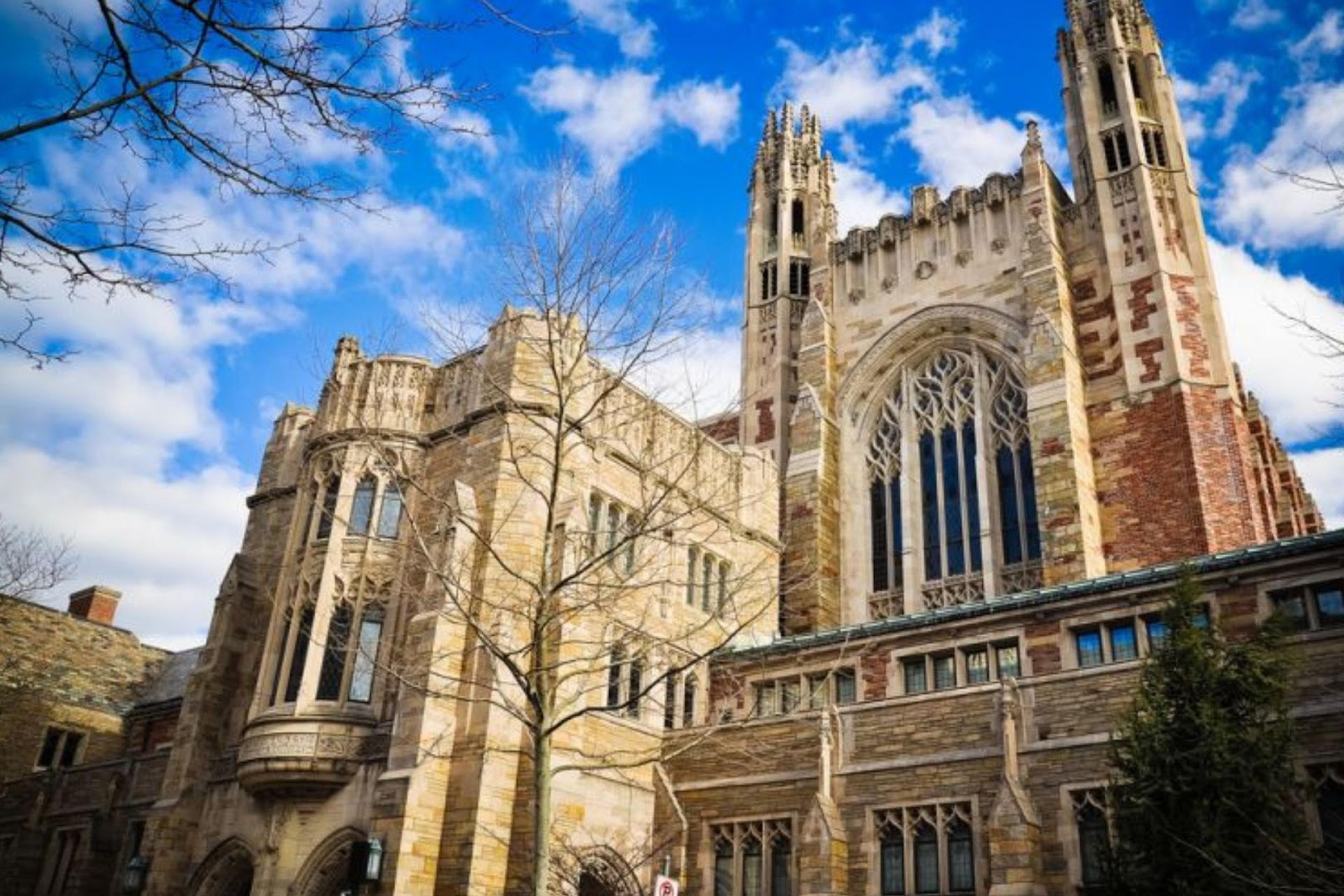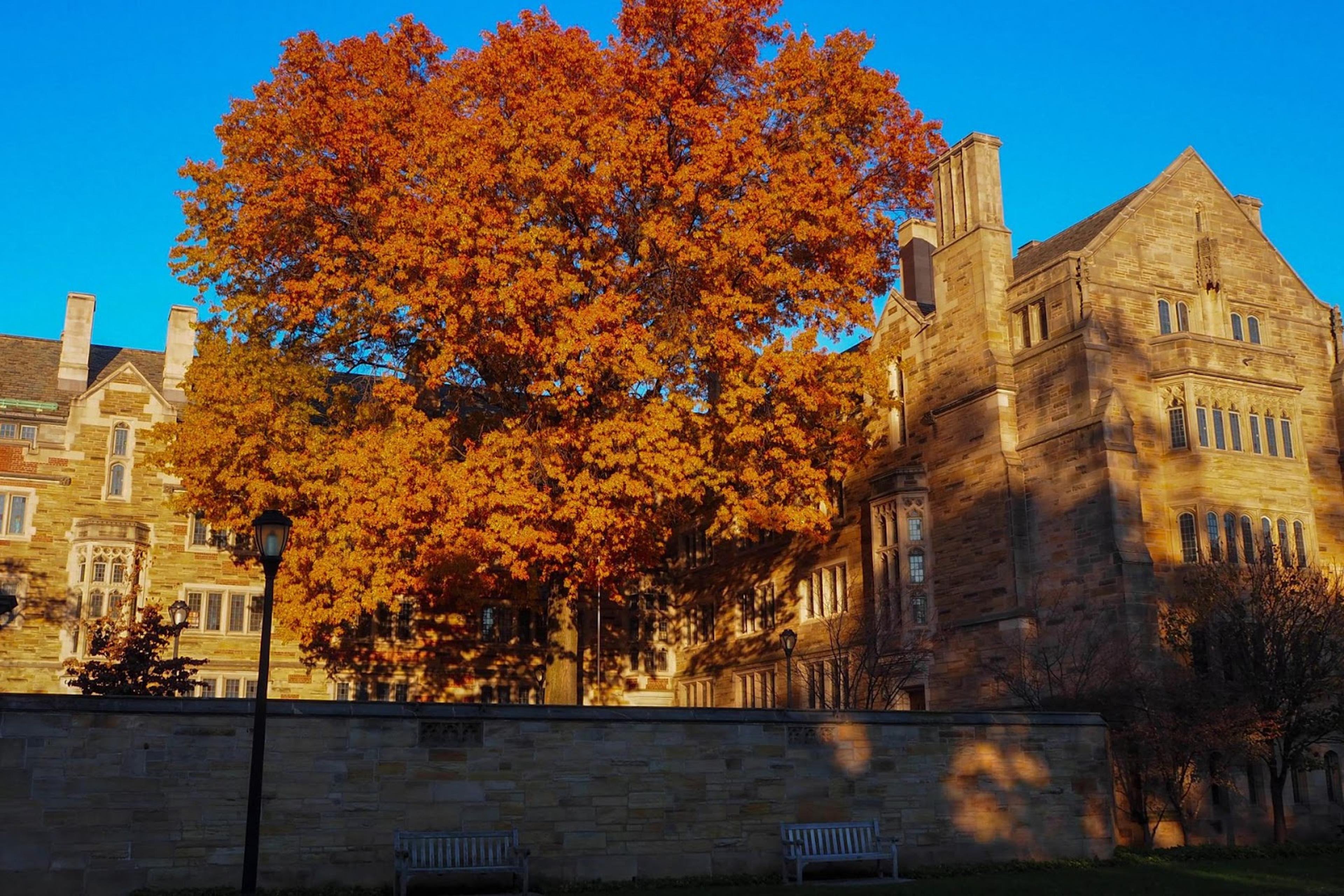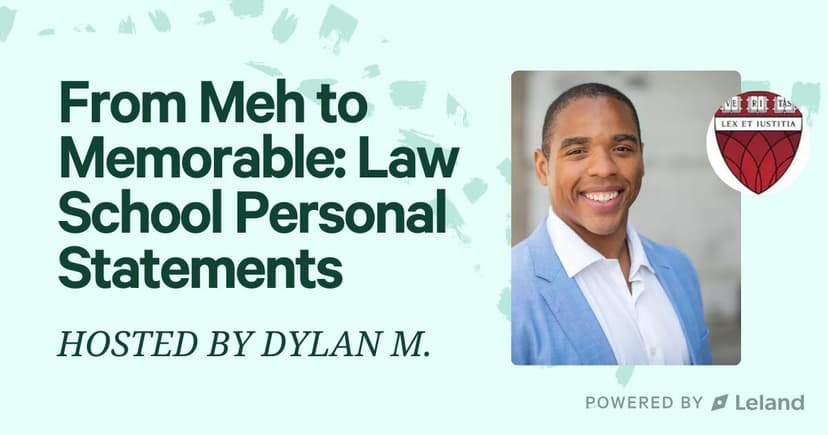How to Get Into Yale Law School (2025)
Everything you need to know about getting into the competitive JD program at Yale Law School, including acceptance rates, deadlines, application overview and tips from expert coaches, and more.
Posted June 13, 2025

Join a free event
Learn from top coaches and industry experts in live, interactive sessions you can join for free.
Table of Contents
How Hard Is It to Get Into Yale Law School?
Yale Law School (YLS) is one of the most selective top law schools in the United States, with an acceptance rate of 5.1% for the J.D. Class of 2027. Yale received 4,449 law school applications, extended 229 offers, and enrolled 204 students.
Yale Law School consistently ranks at the top among other law schools in the country, often holding the number one position. Known for its rigorous academics, world-renowned faculty and fellow students, and vibrant intellectual community, its prestige attracts applicants with exceptional qualifications, and the school values diversity, seeking candidates from varied backgrounds and experiences.
To stand out in the highly competitive law school admissions process, applicants need to demonstrate academic excellence, a compelling personal narrative, and a deep commitment to the legal profession. This guide will help you craft a successful Yale Law School application to join the law school community and to attend Yale Law School.
Yale Law Acceptance Rate Over Time
| Class Year | Applications Received | Offers of Admission | Enrolled 1Ls | Acceptance Rate | Yield |
|---|---|---|---|---|---|
| 2027 | 4,449 | 229 | 204 | 5.1% | 86% |
| 2026 | 5,194 | 214 | 201 | 4.1% | 94% |
| 2025 | 3,539 | 262 | 184 | 7.4% | 70% |
| 2024 | 3,198 | 263 | 184 | 8.2% | 70% |
| 2023 | 3,473 | 238 | 164 | 6.9% | 69% |
Programs Offered by Yale Law School
Juris Doctor (J.D.) Program
Yale’s J.D. program emphasizes flexibility in curriculum design and offers access to legal clinics starting in the first year, providing invaluable practical experience.
Master of Laws (LL.M.) Program
This highly selective program welcomes a small number of students each year, focusing on advanced legal research and intellectual exploration.
Doctor of the Science of Law (J.S.D.) Program
Aimed at aspiring legal education, the J.S.D. requires students to produce groundbreaking dissertations under the guidance of Yale’s world-renowned faculty.

Admissions Requirements — Who Gets Into Yale Law School?
Yale Law School is committed to attracting a diverse and engaged entering class of Yale law students who exemplify leadership, academic excellence, and intellectual curiosity.
Class Profile
- Women: 56%
- Students of Color: 50%
- LGBTQ+: 22%
- First-Generation and/or Low-Income: 24%
- Admitted Students: 204
Academic Metrics
| Percentile | GPA | LSAT Scores |
| 25th | 3.89 | 172 |
| 50th | 3.96 | 174 |
| 75th | 4.00 | 177 |
Note: The GPA range for the Class of 2027 is 3.22 to 4.27, and the LSAT range is 155 to 180.
Yale’s admissions committee carefully evaluates more than test scores. While academic credentials are crucial, personal qualities and contributions to the law school community are also as important.
LSAT
To be competitive for admission to Yale Law School, you'll generally need an LSAT score in the top 1-2% of all test-takers. Based on recent class data, the median LSAT score for admitted students is 174, with the middle 50% ranging from 172 (25th percentile) to 177 (75th percentile). While a score below 172 is possible with a standout application, aiming for 174 or higher maximizes your chances.
If you're submitting the GRE instead of the LSAT, strong scores in the verbal (167) and quantitative (163) sections are key, with a writing score of 5.5 or higher.
GPA
Yale Law School sets a high bar for academic achievement. The median GPA for admitted students is 3.96, with the middle 50% falling between 3.89 (25th percentile) and 4.00 (75th percentile). If your GPA is below 3.89, you'll need to demonstrate extraordinary qualities in other areas of your application, such as work experience, recommendations, or a compelling personal statement.
While an exceptional GPA is critical, Yale also considers your course rigor and undergraduate institution. If your GPA isn’t perfect, aim for top-tier performance in other components of your application to remain competitive.
How to Get Into Yale Law With a Low GPA/Test Score
- Write an outstanding personal statement – Your personal statement and essays are your chance to show Yale University why you’re an exceptional candidate beyond your stats. Share a unique story, highlight meaningful experiences, and demonstrate how your background and goals align with Yale Law’s mission.
- Secure strong letters of recommendation – Obtain letters from professors or employers who can speak to your intellectual ability, work ethic, and character. Yale University values endorsements that provide specific, persuasive examples of your potential.
- Retake the LSAT or take the GRE – If your initial test score is below Yale’s median, consider retaking the LSAT to improve your score. Many applicants see significant improvements with additional preparation. Alternatively, if the LSAT isn’t your strong suit, taking the GRE can be a smart strategy, as it provides another opportunity to showcase your academic potential.
- Write an addendum – If there’s a valid reason for your lower GPA or test score, such as illness, personal hardship, or other extenuating circumstances, write an addendum to explain the situation. Be concise, factual, and professional, focusing on how you’ve grown from the experience and proven your capabilities since.
- Apply early – Submitting your application early in the admissions cycle can provide an advantage. It ensures a smooth review process for your application when more spots are available, increasing your chances of holistic consideration.
- Highlight professional experience – If you’ve been out of undergrad for a while, emphasize your full-time work experience, particularly in leadership or impact-driven roles. Yale values applicants who bring maturity, perspective, and real-world accomplishments.
How to Apply to Yale Law School
YLS Application Deadlines (2024-2025)
- Application Deadline: February 15, 2025
- Decision Notifications: Rolling decisions starting in December 2024
Application Requirements
- Application Fee: $85 (fee waivers available upon request)
- Standardized Test Score: LSAT or GRE (no later than February 15, 2025)
- Transcripts: Submit all undergraduate and graduate transcripts through the LSAC CAS system.
- Letters of Recommendation: A minimum of two is required; up to four may be submitted.
- Resume: One to two pages, highlighting academic, professional, and extracurricular achievements.
- Personal Statement: Required, with no specific word limit but typically ranging between 500-1,000 words.
- 250-Word Essay: Yale law school essays prompt requiring a concise response that showcases intellectual curiosity, creativity, or passion.
5 Expert Tips on How to Get Into Yale Law School
- Tailor your application for Yale's unique culture. Yale places a premium on academic innovation and intellectual curiosity. Highlight your ability to think critically and contribute to cutting-edge legal discussions. Incorporate references to Yale's unique opportunities, such as its small class sizes, clinics, or student-run journals.
- Use the 250-word essay to stand out. This essay is unique to Yale and offers an opportunity to showcase your creativity, intellectual depth, or personal passion. Don’t treat it as an afterthought—craft an engaging, polished piece that reveals an aspect of you not covered elsewhere.
- Emphasize leadership and impact. Yale values applicants who have demonstrated leadership and made tangible impacts in their communities, workplaces, or academic institutions. Use your resume and personal statement to showcase these experiences and how they align with Yale's mission.
- Leverage clinical and scholarly opportunities. Yale offers access to clinics as early as the first year and emphasizes legal scholarship. Research these programs and mention specific ones in your application to demonstrate that you’ve done your homework and are genuinely interested in Yale's offerings.
- Prepare for the interview like a pro. Yale’s interviews are invitation-only and focus on your intellectual and professional aspirations. Be prepared to discuss your long-term goals, why Yale is the right fit, and how you plan to contribute to its community. Practice responding to curveball questions that test your critical thinking and self-awareness.
Get Into Yale Law School with the Help of an Expert
- Academic Excellence is Critical: To remain competitive, aim for a median LSAT score of 174 and a GPA of 3.96 or higher. If your academic credentials are below average, compensate with strong essays, work experience, or unique personal achievements.
- Craft a Memorable Application: Use your personal statement, resume, and Yale-specific essays to tell a cohesive, compelling story that highlights your individuality.
- Showcase Leadership and Impact: Whether through work, volunteering, or extracurricular activities, demonstrate how you’ve made a difference and how you’ll contribute to Yale's community.
- Start Early and Stay Strategic: Planning ahead allows you to refine your materials and address weaknesses in your application.
Connect with top law school admission coaches who can help you craft a standout application, from brainstorming essay topics to perfecting your interview skills. Their expertise could be the key to unlocking your dream of attending Yale Law School.
FAQs
Does Yale require the SAT for 2024?
- Yale University will require standardized test scores for students applying for the class entering in the fall of 2025, becoming the second Ivy League university to abandon test-optional policies that had been widely embraced during the COVID pandemic.
What is the deferral rate for Yale 2024?
- This is good news for you because it means that a much smaller group of applicants is being pushed along into the regular decision pool. For the Class of 2027, for example, only 21% of applicants were deferred, down from 56% for the Class of 2024.
What type of student does Yale look for?
- The single most important document in your application is your high school transcript, which tells us a great deal about your academic drive and performance over time. We look for students who have consistently taken a broad range of challenging courses in high school and have done well.
Is going to Yale Law worth it?
- Yale Law School is one of the world's premier law schools, offering an unmatched environment of excellence, a flourishing intellectual life, and an abundance of opportunities to engage with the law.
How smart do you have to be to get into Yale Law School?
- With an incoming class size of around 200 students per year and a 4:1 student-to-faculty ratio, Yale Law School is on the smaller end of top-tier law schools in a way that can make it seem like an even more elite club. GPA distribution and range: 25th percentile: 3.89/4.0. 50th percentile: 3.96/4.0.
Can you get a full ride to Yale Law?
- Hurst Horizon Scholarships will be awarded to students whose family income is up to 200% of the federal poverty guidelines and whose assets are below $150,000. Students who meet the financial requirements will automatically receive a scholarship that will fully cover the cost of tuition, fees, and health insurance.
Is Yale Law worth the debt?
- Yale law graduates go on to earn much more than those who didn't go to university. In fact, the average salary of former Yale students is $118,400. That's 245% higher than the national average. You can't argue with the stats.
Why is Yale the #1 law school?
- Yale Law School is unique among law schools in that it produces leaders across every sector of society: distinguished deans and faculty members at law schools across the country and the world.
Browse hundreds of expert coaches
Leland coaches have helped thousands of people achieve their goals. A dedicated mentor can make all the difference.
















